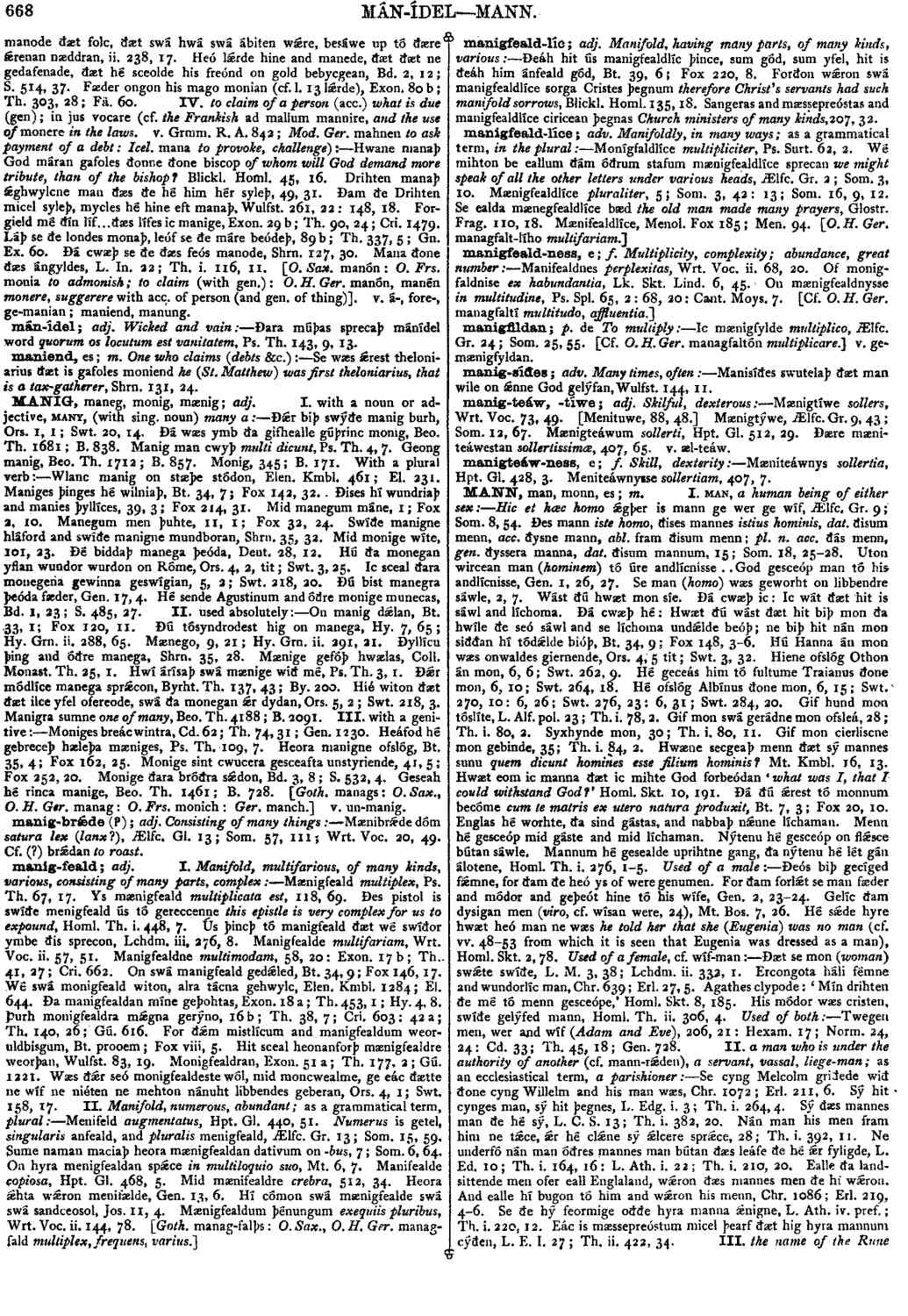MANN
- noun [ masculineneuter ]
-
Hic et hæc homo
ǽgþer is mann ge wer ge wíf,
- Ælfc. Gr. 9 ;
- Som. 8, 54.
-
Ðes mann
iste homo,
-
ðises mannes
istius hominis,
-
dat.
ðisum menn,
-
acc.
ðysne mann,
-
abl.
fram ðisum menn;
-
pl. n. acc.
ðás menn,
-
gen.
ðyssera manna,
-
dat.
ðisum mannum,
- 15 ;
- Som. 18, 25-28.
-
Uton wircean man
(hominem)
tó úre andlícnisse . . God gesceóp man tó his andlícnisse,
- Gen. 1, 26, 27.
-
Se man (
homo
)wæs geworht on libbendre sáwle,
- 2, 7.
-
Wást ðú hwæt mon síe. Ðá cwæþ ic: Ic wát ðæt hit is sáwl and líchoma. Ðá cwæþ hé: Hwæt ðú wást ðæt hit biþ mon ða hwíle ðe seó sáwl and se líchoma undǽlde beóþ; ne biþ hit nán mon siððan hí tódǽlde bióþ,
- Bt. 34, 9 ;
- Fox 148, 3-6.
-
Hú Hanna án mon wæs onwaldes giernende,
- Ors. 4, 5 tit ;
- Swt. 3, 32.
-
Hiene ofslóg Othon án mon,
- 6, 6 ;
- Swt. 262, 9.
-
Hé geceás him tó fultume Traianus ðone mon,
- 6, 10 ;
- Swt. 264, 18.
-
Hé ofslóg Albínus ðone mon,
- 6, 15 ;
- Swt. 270, 10: 6, 26 ;
- Swt. 276, 23: 6, 31 ;
- Swt. 284, 20.
-
Gif hund mon tóslíte,
- L. Alf. pol. 23 ;
- Th. i. 78, 2.
-
Gif mon swá gerádne mon ofsleá,
- 28 ;
- Th. i. 80, 2.
-
Syxhynde mon,
- 30 ;
- Th. i. 80, 11 .
-
Gif mon cierliscne mon gebinde,
- 35 ;
- Th. i. 84, 2.
-
Hwæne secgeaþ menn ðæt sý mannes sunu
quem dicunt homines esse filium hominis?
- Mt. Kmbl. 16, 13.
-
Hwæt eom ic manna ðæt ic mihte God forbeódan
`what was I, that I could withstand God?'
- Homl. Skt 10, 191.
-
Ðá ðú ǽrest tó monnum becóme
cum te matris ex utero natura produxit,
- Bt. 7, 3 ;
- Fox 20, 10.
-
Englas hé worhte, ða sind gástas, and nabbaþ nǽnne líchaman. Menn hé gesceóp mid gáste and mid líchaman. Nýtenu hé gesceóp on flǽsce bútan sáwle. Mannum hé gesealde uprihtne gang, ða nýtenu hé lét gán álotene,
- Homl. Th. i. 276, 1-5.
-
Used of a male :--
Ðeós biþ gecíged fǽmne, for ðam ðe heó ys of were genumen. For ðam forlǽt se man fæder and módor and geþeót hine tó his wífe,
- Gen. 2, 23-24.
-
Gelíc ðam dysigan men (
viro,
cf. wísan were, 24),- Mt. Bos. 7, 26.
-
Hé sǽde hyre hwæt heó man ne wæs
he told her that she (Eugenia) was no man
(cf. vv. 48-53 from which it is seen that Eugenia was dressed as a man),- Homl. Skt. 2, 78.
-
Used of a female, cf. wíf-man :--
Ðæt se mon
(woman)
swǽte swíðe,
- L. M. 3, 38 ;
- Lchdm. ii. 332, 1.
-
Ercongota háli fémne and wundorlíc man,
- Chr. 639 ;
- Erl. 27, 5.
-
Agathes clypode: `Mín drihten ðe mé tó menn gesceópe,'
- Homl. Skt. 8, 185.
-
His módor wæs cristen, swíðe gelýfed mann,
- Homl. Th. ii. 306, 4.
-
Used of both :--
Twegen men, wer and wif
(Adam and Eve),
- 206, 21: Hexam. 17 ;
- Norm. 24, 24: Cd. 33 ;
- Th. 45, 18 ;
- Gen. 728.
-
Se cyng Melcolm griðede wið ðone cyng Willelm and his man wæs,
- Chr. 1072 ;
- Erl. 211, 6.
-
Sý hit cynges man, sý hit þegnes,
- L. Edg. i. 3 ;
- Th. i. 264, 4.
-
Sý ðæs mannes man ðe hé sý,
- L. C. S. 13 ;
- Th. i. 382, 20.
-
Nán man his men fram him ne tǽce, ǽr hé clǽne sý ǽlcere sprǽce,
- 28 ;
- Th. i. 392, 11.
-
Ne underfó nán man óðres mannes man bútan ðæs leáfe ðe hé ǽr fyligde,
- L. Ed. 10 ;
- Th. i. 164, 16: L. Ath. i. 22 ;
- Th. i. 210, 20.
-
Ealle ða land-sittende men ofer eall Englaland, wǽron ðæs mannes men ðe hi wǽron. And ealle hí bugon tó him and wǽron his menn.
- Chr. 1086 ;
- Erl. 219, 4-6.
-
Se ðe hý feormige oððe hyra manna ǽnigne,
- L. Ath. iv. pref. ;
- Th. i. 220, 12.
-
Eác is mæssepreóstum micel þearf ðæt hig hyra mannum cýðen,
- L. E. I. 27 ;
- Th. ii. 422, 34.
-
ǽnig RUNE
quis,
- Rtl. 11, 41.
-
Ne ǽnig RUNE
nemo,
- 13, 25, 29.
-
ᛗ byþ on myrgþe,
- Runic pm. Kmbl. 343, 11 ;
- Rún. 20.
- Exon. 124 a ;
- Th. 477, 14 ;
- Ruin. 24.
Bosworth, Joseph. “MANN.” In An Anglo-Saxon Dictionary Online, edited by Thomas Northcote Toller, Christ Sean, and Ondřej Tichy. Prague: Faculty of Arts, Charles University, 2014. https://bosworthtoller.com/22348.
Checked: 1